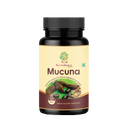Mucuna
Mucuna







Introduction-
Mucuna pruriens, also known by its Sanskrit name kapikacchu, is a nutritive tonic and adaptogen commonly used to nourish the nervous system, support healthy sexual energy, and strengthen and tone the reproductive organs. This beautiful plant with its velvety seed pods is also a natural source of levodopa (L-dopa), which is an essential precursor to the neurotransmitter dopamine. Thanks to this attribute, it’s revered for its ability to uplift one’s mood and enhance a sense of emotional well-being.
Characteristics of the Mucuna Plant
Mucuna is a creeping vine that grows all over India, particularly in the tropics and is also found in tropical regions of Africa and the Caribbean. A member of the Fabaceae family (or legumes), it is characterised by its delicate lavender or purple flowers and fuzz-covered pods, each containing multiple large beans. Mucuna is well known by two Sanskrit names: kapikacchu, which means one who starts itching like a monkey, and atmagupta, which means secret self, hinting at the value of the seed concealed within the allergenic seedpod. In English, the common name for this plant is cowhage, and it is also sometimes referred to as magic velvet bean, hinting at its mystical properties.
Mucuna has been recognised and used for thousands of years in the world of Ayurvedic herbs. There are traditional uses for the root and the trichomes (the irritating hairs themselves), but the large, dense seeds found within the pods offer the powerful rejuvenating qualities that this herb is best known for. It’s these nourishing seeds that are most often used.
Mucuna in Ayurveda
Mucuna's vitality nourishes the entire body and calms the nerves, making it an excellent rejuvenating agent for Vatta and pitta dosha. While it can be useful for imbalances of a tridoshic origin—those that involve vata, pitta, and kapha—it is typically too dense and heavy for Kapha.
Mucuna’s rasa, or taste, is primarily sweet and bitter. Its virya (action in the body) is warming, and its vipaka (post-digestive effect) is sweet. Thanks to its nourishing and building qualities, this herb is excellent for building ojas, the body’s reserve of essential energy, immunity, and vitality. Mucuna has an affinity for all of the tissues in the body but is especially suited to balance the nervous, reproductive, and digestive systems. Its therapeutic qualities are wonderful for the entire nervous system, particularly when excess vata has accumulated in majja dhatu (the nervous tissue).In Ayurveda, different parts of plants are seen to work on different tissues in the body, and not surprisingly, fruits and seeds correlate with the reproductive system. The mucuna seeds are revered as one of the best reproductive tonics available in the plant kingdom, supporting every aspect of shukra (reproductive tissue).
Mucuna Pruriens Benefits and Uses

- Promotes a healthy nervous system. As a rejuvenating herb, mucuna has a profoundly nourishing and rejuvenating effect. It can minimise the effects of stress while supporting a calm and stable nervous system.
- Supports the brain and intellect. As an extension of the nervous system, the brain and intellect are also strengthened and rejuvenated by mucuna’s nourishing qualities. The heavy, oily qualities of the seeds lend strength to any weakened areas of the body. In fact, the seeds of Mucuna pruriens are considered a tonic specific to healthy neurons.
- Supports motor skills and coordination. Mucuna’s work in the nervous system directly affects the muscles as well, encouraging fluid muscular movements, proper sensation, coordination, and keen motor skills.
- Revitalizes the reproductive system. Mucuna is a reproductive tonic that offers support to everyone, including but not limited to those who identify as male and female. It supports fertility, healthy sperm and ova, proper functioning of the reproductive organs, and healthy genital secretions. As an aphrodisiac, mucuna bolsters healthy sexual energy and libido.
- Supports healthy digestion and elimination. Because it promotes smooth muscle contractions, mucuna can help foster healthy digestive function and promote proper elimination.
- Provides significant nutritional content. Mucuna helps to support and maintain balanced blood sugar levels that are already in the healthy range. The seeds themselves are considered to be high in dietary nutrition, with nutritive values similar to other commonly consumed legumes. The green pods and whole beans are traditionally boiled and eaten in the Himalayas.
- Natural source of levodopa (L-dopa). Mucuna’s naturally occurring levodopa is an essential precursor of the neurotransmitter dopamine, which contributes to brain and nervous system health. Dopamine plays an important role in behaviour, cognition, voluntary movement, sleep, mood, working memory, and learning.





